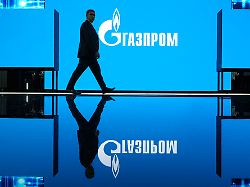Wagner is not the only Russian paramilitary group fighting in Ukraine. Units set up by the Gazprom group are apparently also in use there.
For many years, the Kremlin has used Gazprom as a political weapon. But with the Russian invasion of Ukraine, the state-controlled gas giant has become a weapon in the literal sense: Gazprom has set up its own paramilitary force – and apparently some of these men are fighting in Ukraine.
Gazprom was never a normal company. Together with the oil giant Rosneft, the group is the heart of the Russian economy. The world’s largest gas supplier is not only a bubbling source of income for the national budget and a self-service shop for the Kremlin elite and their minions. Gazprom is also a tool the Kremlin uses to try to impose its will on other governments. After the successful Maidan protests in Kiev, Gazprom increased the gas price for Ukraine and temporarily turned off the tap completely. After the invasion of Ukraine, the Kremlin created an energy crisis in the European Union.
Almost half a million people work for the group, which reported record profits of around 28 billion euros in 2021 – the year before the robbery. With the attack, however, revenue collapsed.
Gazprom has been managed by Putin buddy Alexei Miller since 2001. Dmitri Medvedev – once the hope of the Russian liberals, then interim president, now agitators and the hottest candidate for the vacant post of court jester in the Kremlin – has been a member of the supervisory board since 2000 and was its chairman for a few years.
Wagner boss rages
There are numerous paramilitary groups in Russia. Most of them are formally branches of the Russian secret services and armed forces, some are funded by oligarchs or by corporations. The sponsors of the militias are primarily concerned with securing their assets and influence.
The best-known as well as the most notorious group is the Wagner Troupe, led by businessman Yevgeny Prigozhin, which, suffering heavy casualties, captured the Ukrainian city of Bakhmut with men recruited from prisons. Prigozhin is also the one who drew attention to the Gazprom militia in the spring. In a half-hour video, he lashed out at rival troops and accused them of wanting to steal the show from him – and his sources of funding.
The Wagner boss mentioned in this connection three units with the names “potok” (German: “river”), “fakel” (“torch”) and plamya (“flame”). According to Prigozhin, he spoke to “Potok” men who were fighting in Ukraine. They were dirty, exhausted and scared and complained about poor equipment. Some said they had been lied to about their location. They were told they were guarding a factory in Russian-occupied Luhansk – and didn’t have to fight at the front.
Prigozhin’s statements cannot be independently verified. But in February the Russian government published a decree by Gazprom’s oil subsidiary Gazprom-Neft allowed to set up their own private security force. The official purpose: to protect their oil wells and associated infrastructure such as oil storage facilities, pipelines and refineries – not only in Russia, but also in Ukraine and Syria. The company then set up a company called “Gazpromneft Security” in Omsk, Siberia. What exactly this company does is not known. Gazprom did not answer questions from ntv.de.
Recruitment instead of mobilization
However, research by the “Financial Times” and the “BBC” suggests that Gazprom has set up its own force and that members are deployed in Ukraine. According to the “FT”, Gazprom apparently only recruits its own security personnel throughout Russia and, above all, lures them with high pay.
Shadow armies are useful to the Kremlin. Their battalions are part of an opaque network of paramilitary units that have mushroomed after the failure of the regular military’s all-out attack earlier in the war. During the capture of Bachmut, Wagner showed that irregular troops can make a significant contribution to military success.
Another advantage for the Kremlin is that recruiting mercenaries can potentially avoid new conscriptions. According to Western estimates, 200,000 Russian militants have been injured or killed in Ukraine since the invasion began. Tens of thousands of Russians left their country in the face of partial mobilization last September.
Oligarchs and corporations can demonstrate their loyalty to Putin and their support for the war by setting up paramilitary units. Gazprom may also have the cynical calculation of preferring to see specially recruited, low-skilled security personnel at the front rather than engineers drafted by the state military.
All of this has to be seen against the background that at some point Putin will no longer be president of Russia – he may be overthrown, he may die a natural death. Prigozhin said the creation of paramilitary units has also become fashionable in Russia “because some of the most influential men believe that mercenaries will join a future power struggle can prove valuable.”
